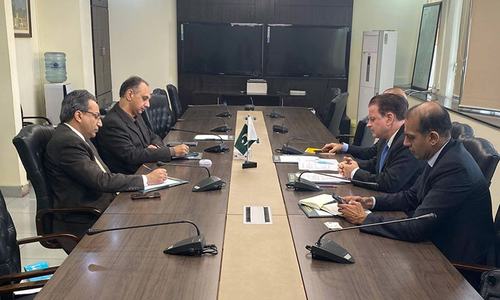ISLAMABAD: Due to the adverse impact of the coronavirus pandemic on the economy, the government on Tuesday decided to revise all international and local agreements in the energy sector, including those related to Independent Power Projects (IPPs) and Liquefied Natural Gas (LNG), to provide relief to the common man.
The decision was taken in a meeting of the federal cabinet chaired by Prime Minister Imran Khan. During the meeting Adviser to the Prime Minister on Finance Dr Hafeez Shaikh presented a ‘budget strategy paper’ aimed at reviewing the federal fiscal budget in the backdrop of the global virus outbreak currently affecting over 150 states.
The prime minister said the adverse impact of the virus on the country’s economy should not hit the common man and poor segments of society.
Recommendations of the Council of Islamic Ideology (CII) and Ministry of Religious Affairs were also presented before the cabinet which suggested offering of the shortest possible Juma and collective prayers at mosques by a minimum number of people, excluding aged people and children, and postponement of religious congregations in mosques, Imambarghas, churches and madressahs.
Federal cabinet approves ‘budget strategy paper’ aimed at reviewing federal fiscal budget
“When such a global crisis arises, nations revise their annual budgets, therefore, we are revising international agreements in the energy sector,” Special Assistant to the PM on Information and Broadcast Dr Firdous Ashiq Awan said in a post-cabinet meeting press conference.
The cabinet meeting was held on a two-point agenda — budget strategy paper and a presentation on the power sector.
She said the cabinet was apprised that when the previous government had inked international agreements in the energy sector, the value of the US dollar was 50 to 60 Pakistani rupees, but now the value of the dollar was Rs158. “The benefit of devaluation of the local currency is going to international firms and, therefore, we are going to revise these agreements to help support the country’s economy,” she added.
Dr Awan said the cabinet had given approval to the budget strategic paper aimed at economic stability by controlling inflation, meeting targets of the government-IMF agreement, improving growth rate, creating job opportunities, reducing budget deficit and loans, increasing revenue, controlling expenditures, safeguarding weak sections of society, taking effective measures to fight natural calamities and extending the process of reforms in state institutions.
The meeting was informed that the budget strategic paper gave priority to some departments regarding meeting their expenditures. They included defence, security and sensitive organisations, social welfare, Public Sector Development Programme, pays of government employees, housing/Naya Pakistan Housing Programme, food security, health higher education and tourism.
Dr Hafeez Shaikh apprised the meeting that the government had retired Rs5,000 billion foreign debts, the gap between income and expenditure had been reduced and ministries had been financial empowered. An increase of 17 per cent has been witnessed in revenue collection. He said a sum of Rs950bn had been earmarked for the Public Sector Development Programme and Public Private Partnership.
The meeting was told that major upsurge had been received on account of non-tax revenue (NTR) — the recurring income from sources other than taxes. This can be gauged from the fact that a total of Rs894.5bn target for NTR had been set for the full year while actual collection in just half of the year amounted to Rs719bn.
The actual six-monthly collection from telecom licences amounted to Rs110bn against a full year target of just Rs54bn while the central bank profit in first half of the year at Rs427bn was higher than Rs406bn target set for the whole year.
The meeting was informed that overall direct taxes were targeted at Rs824bn for July-December 2019 period but actual collection came in at Rs784bn, leaving a shortfall of Rs40bn. The sales tax was targeted at Rs887bn but actual collection stood at Rs859bn, a gap of Rs28bn.
Likewise, the adviser reported federal excise collection of Rs122bn in first six months of the year compared to Rs149bn target, a shortfall of Rs27bn. Also, the customs collections amounted to Rs328bn against a target of Rs338bn, a gap of Rs10bn.
Responding to the opposition’s allegations that the government was not serious in controlling coronavirus and made delays in conducting operations, Dr Awan said the opposition should not go for political point scoring on this issue.
Published in Dawn, March 18th, 2020















































